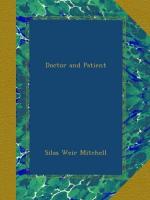Above all, let such a woman avoid all forms of emotion. Her former standards of resistance apply no longer, and what once did not disturb will now shake her to the centre. A time comes, however, when she will do well to meet and relearn to bear calmly all the little emotional trials of life. I know a nervous woman—and no coward, either—who for months, and wisely, read no newspapers, and who asked another to open and read all her letters and telegrams. The day came when she was able to resume the habits of health, but for a long time the telegram at least was a sore distress, and she could only meet it by a resolute putting of herself in the attitude of tranquillity of which I have spoken. To say more should be needless. For the nervous strong emotions are bad or risky, and from violent mirth to anger all are to be sedulously set aside. Calm of mind and quiet of body are what she most needs to aid the more potent measures of the physician.
The woman in the situation I have described has probably a variety of symptoms on which her condition causes her to dwell. A great many of them are of little practical moment. If she is irresolute and weak, she yields where she should not, and finds for inactivity or for fears ample excuses in the state of her own feelings. An unwholesome crop of disabilities grows out of these conditions. It then becomes the business of her physician to tell her what is real, what is unreal, what must be respected, what must be overcome or fought. She has acquired within herself a host of enemies. Some are strong, some are feeble. The hour for absolute trust has arrived, and she must now believe in her adviser, or, if she cannot, she must acquire one in whom her belief will be entire and unquestioning.
Let us take an illustration. Such a woman is apt enough to suffer from vertigo or giddiness. “If I walk out,” she says, “I become giddy. I am rarely free from this unless I am in bed, and it terrifies me.” You know in this case that she is still strong enough to exercise in moderation. You say, “Walk so much daily. When you fall we will think about stopping. Talk to some one when you go out; have a friend with you, but walk.” She must believe you to succeed. This is a form of faith-cure which has other illustrations. You tell her that she must disregard her own feelings. She credits you with knowing, and so wins her fight.
There is a sense of fatigue which at some time she should learn to treat with disrespect, especially when disuse of her powers has made their exercise difficult, and yet when returning health makes it wise to employ them. To think, and at last to feel sure that she cannot walk is fatal. And above all, and at all times, close attention to her own motions is a great evil. We cannot swallow a pill because we think of what, as regards the larger morsels of food, we do automatically. Moreover, attention intensifies fatigue. Walk a mile, carefully willing each leg-motion, and you will be tired. The same evil results of attention are observed in disease as regards other functions over which we seem in health to be without direct power of control.




